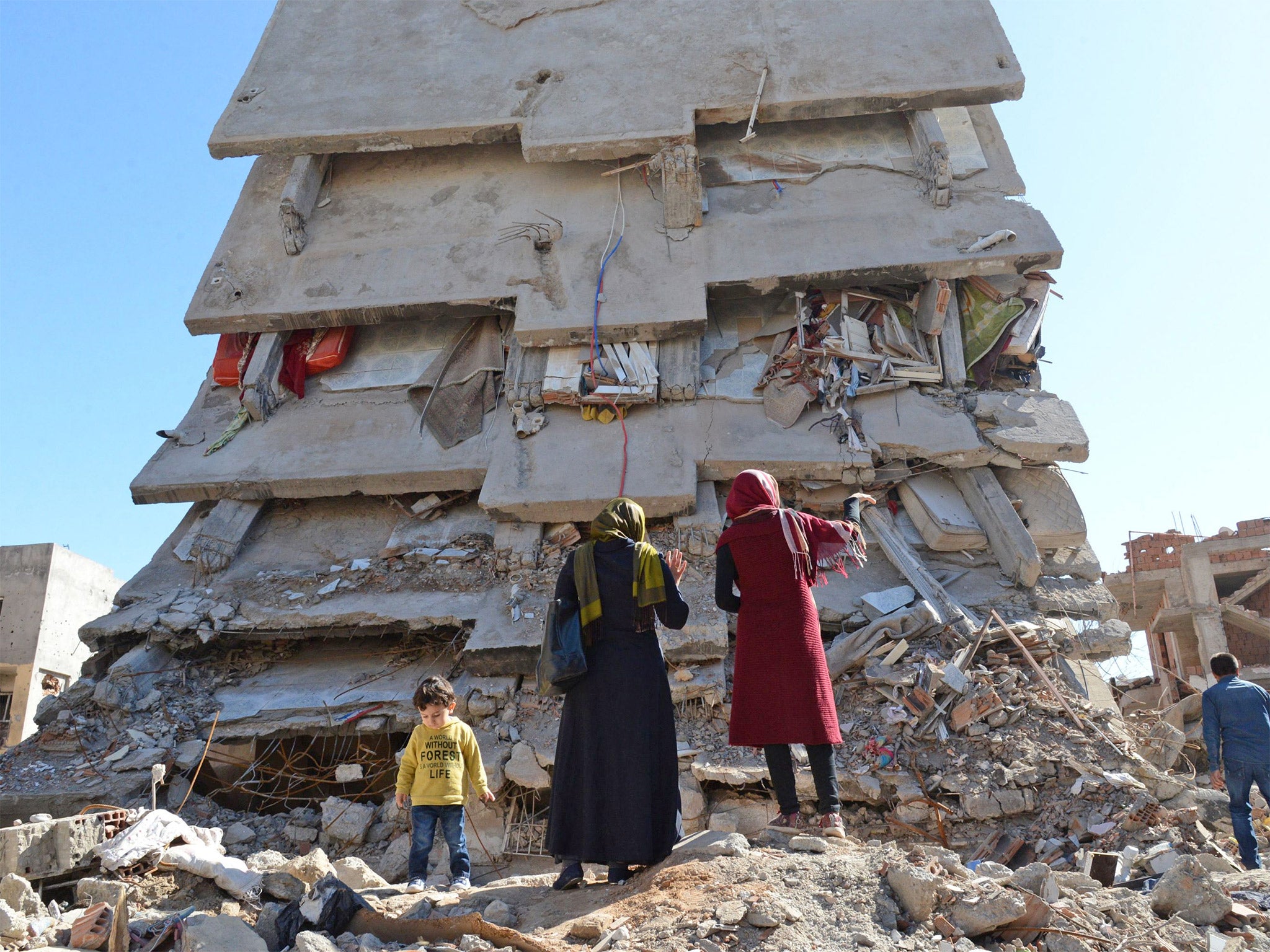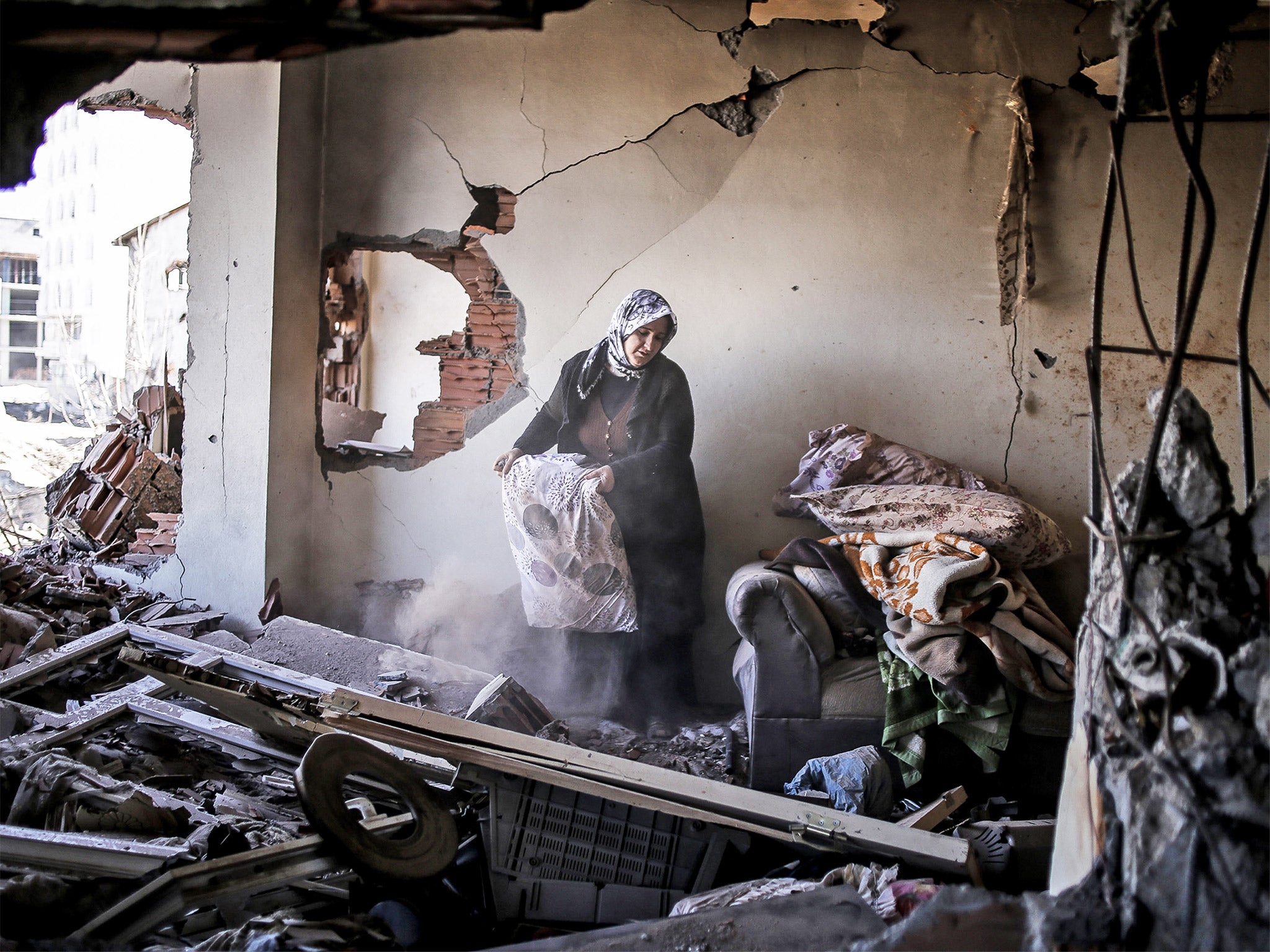Turkey in crisis: Military eases curfew after assault on PKK rebels that left Kurdish town of Cizre in ruins
First wave of residents begin to return to find gutted or partially collapsed buildings and shell casings littering the battle-scared streets

Ayse Magi inspected the damage done to her modest home in the town of Cizre, tears in her eyes. Two mortar shells had punctured the ceiling of the bathroom and hallway, and the result was clear: “There is no way we can live here,” she said.
The mother-of-five was among many residents who were displaced by weeks of operations conducted by Turkey’s security forces against militants linked to the Kurdistan Workers’ Party (PKK), which wants autonomy for the country’s Kurds.
Ms Magi chose to remain within the city despite a gruelling 24-hour curfew that had been imposed on 14 December. Now, the Turkish military has eased that curfew – although it will still hold between 7.30pm and 5am – allowing a first wave of residents who had left Cizre to return. Many reached the town at dawn, their vehicles loaded with personal belongings and children. Police carefully inspected their documents as well as the contents of their cars and bags. Many of the returnees also found their homes obliterated.
The town near the borders of Syria and Iraq, with a population of more than 100,000, has been the worst hit of a handful of mainly southeastern Kurdish districts that have seen operations by Turkey’s government against the PKK.
The level of damage seen in some neighbourhoods evoked the early days of the war in Syria, with buildings gutted by shelling or partially collapsed. Shell casings littered the battle-scared streets of the Sur neighbourhood, where residents made a grisly discovery: the corpse of an unidentifiable male, on of a number of bodies reportedly found during the day.
“Those who did this are not human,” said resident Serif Ozem. “What took place here is a second Kobani in a country that is supposed to be a democracy.”

Kobani is a predominantly Kurdish town in northern Syria that suffered a brutal siege at the hands of Isis.
Several shops and homes in the Sur area of Cizre had their walls blasted open. Windows were shattered and doors unhinged, the smell of gunpowder still clinging to the breeze.
Turkish military-imposed curfews remain in the historic district of the main Kurdish city of Diyarbakir – which is also called Sur – and in Idil, a district in Sirnak province, where Turkish forces are continuing operations against Kurdish militants.
The army says more than 600 Kurdish rebels were killed in Cizre. Human rights groups claim that 92 civilians were killed in the town during the military operation. Ozturk Turkdogan, who heads the Ankara-based Human Rights Association, said an additional 171 bodies have been retrieved from three basements in Cizre since Turkey declared the battle over on 11 February.
Govenor Ali Ihsan Su of Sirnak province warned returning Cizre residents to be careful about possible undetected explosive devices in their homes. Three large booms were heard in the morning, which police said were controlled explosions to clear booby traps. Police said the curfew in Cizre could not be lifted immediately after the military operations ended last month because troops had to clear leftover explosives.
Blaming the militants for the destruction of the town, the governor said 708 barricades were dismantled, 264 trenches filled in and 1,409 improvised explosive devices disposed of. In addition, security forces seized “large numbers” of automatic weapons, other firearms and hand grenades.
“They destroyed houses by placing explosives from the kitchens to the bedrooms. They attacked callously and mercilessly, without distinguishing between military, police, women, men, old or young,” Mr Su said.
Shoe shop owner Nesim Cavusoglu, who stayed during the curfew, despaired over the destroyed facade of his business.

“This is all that is left,” he said, gesturing at the rubble and a handful of shoe boxes.
Police said the curfew could not be lifted immediately after the military operations ended because troops had to clear leftover explosives.
Prime Minister Ahmet Davutoglu has promised to reconstruct Cizre and other districts ruined by the fighting.
The PKK, considered a terror group by Turkey and its allies, has been waging an insurgency in southeastern Turkey since 1984. The conflict has killed tens of thousands of people since then. A fragile, two-year-old peace process with the rebels broke down in July. Nurettin Guler, a 55-year old who stayed in Cizre amid the worst fighting, was pessimistic about the next phase.
“They say the operations have ended, but we just don’t know,” he said. “If peace isn’t achieved... it’s not over.”
AP
Join our commenting forum
Join thought-provoking conversations, follow other Independent readers and see their replies
Comments
Bookmark popover
Removed from bookmarks